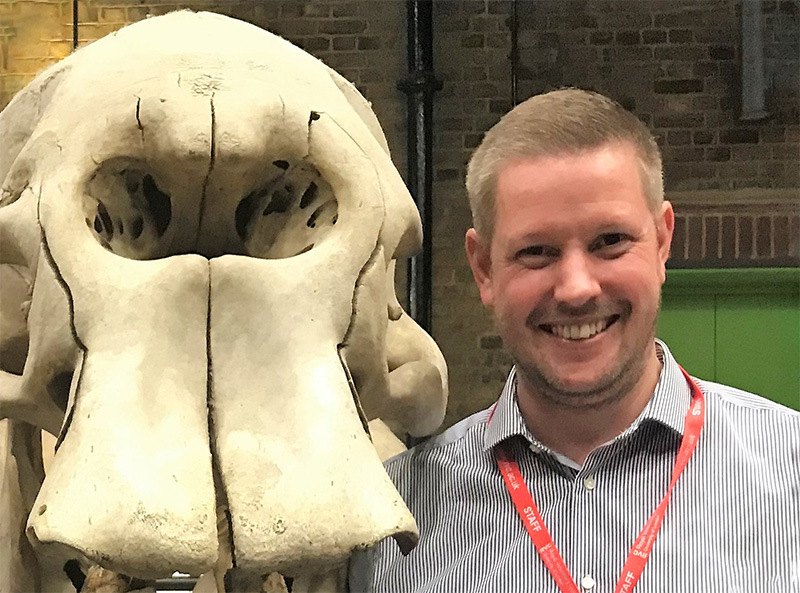Skeletal regeneration expert joins RVC to investigate osteoarthritis gene therapy
Dr Scott Roberts, who joins the Royal Veterinary College (RVC) as Senior Lecturer in Translational Skeletal Research in the Department of Comparative Biomedical Sciences, has recently initiated a programme of research to investigate the potential of gene therapy for the treatment of osteoarthritis.

This research is inspired by Dr Roberts’ interest in skeletal stem cell signalling and the effect of signal modulation on skeletal tissue regeneration. He initiated this work during his time at KU Leuven (Belgium), but has subsequently researched this topic as Principal Investigator at University College London and as Senior Principal Scientist at UCB Pharma. During his time at UCB, Dr Roberts identified musculoskeletal drug targets and led the subsequent drug discovery projects. His research has resulted in several patent applications on the use of cells and therapeutic antibodies to promote the regeneration of bone and cartilage.
The new gene therapy research programme in osteoarthritis will be undertaken in partnership with the LEP funded Vaccinology and Cell Therapy Hub at the RVC. This will not only provide an environment for further research on regenerative medicine, but also the facilities to create reagents for clinical translation.
The Hub – with its close connections to both scientists and veterinary clinicians – is also well-placed to take the science from bench-to-bedside and facilitate clinical trials in veterinary patients. This will include horses at the Equine Referral Hospital, and dogs and cats at the Queen Mother Hospital for Animals at the RVC.
It is proposed that this treatment would transition into human clinical studies, exemplifying the RVC’s commitment to the ‘One Health’ approach which recognises and facilitates the synergy between animal and human health.
The Vaccinology and Cell Therapy Hub is also conveniently located close to the Stevenage Bioscience Catalyst. This world leading science location focuses on incubating capabilities in cell and gene technologies, boasting a state-of-the-art ‘Cell & Gene Therapy Catapult’ manufacturing centre. It is envisaged that such partnerships, alongside Dr Roberts’ connections in both academia and industry, will enable future industrial collaboration and commercialisation of this pioneering research.
Dr Scott Roberts, who is leading the research, said: “This research has the potential to change the way that we approach degenerative joint disease and I am delighted to have access to the Vaccinology and Cell Therapy Hub while we undertake this work. We hope that this science will lead to a ground-breaking treatment for osteoarthritis in animals, and eventually humans. We are optimistic about the future of this research, particularly given its contribution to the RVC’s ‘One Health’ ethos. I look forward to taking advantage of the RVC’s world-leading facilities, as well as the scientists and clinicians who will help us take this research forward.”
Professor Jonathan Elliott, Vice Principal of Research and Innovation at the RVC, said: “We are delighted that Scott Roberts has joined the RVC and will pursue his translational research into novel therapies that stimulate repair of cartilage for osteoarthritis in horses, dogs and people. This appointment builds on the RVC’s expertise in Skeletal Biology. Scott’s links to the Pharma Industry are very important for his translational science to have impact. His work fits perfectly with the goals of our soon to open Vaccinology and Cell Therapy Hub, made possible by the funding from the Hertfordshire Local Enterprise Partnership.”
Paul Witcombe, Head of Enterprise and Innovation, Hertfordshire Local Enterprise Partnership, said: “This programme of research will help drive the translational research on animal health into the development of products to combat disease in humans. The LEP invested £7m towards this new Hub to support the advance of potentially life-saving revolutionary treatments and the development of a globally significant cell and gene cluster in Hertfordshire.”
The research Dr Roberts is undertaking is critical as cartilage has a very poor capacity to repair itself, with cartilage injuries often progressing to osteoarthritis. There is also currently no approved evidence-driven therapy for the treatment of this disease.
In addition to osteoarthritis, Dr Roberts’ research aims to create regenerative therapeutics for non-healing bone fractures. This is based on a comprehensive understanding of tissue development, as tissue repair is now regarded as a re-emergence of embryonic signalling cascades. Dr Roberts has used knowledge in this area to identify developmentally inspired methodologies to create laboratory grown tissue implants that have the capacity to drive bone fracture repair.
Notes to Editors
For more information please contact:
- Jasmin De Vivo (Jasmin.DeVivo@plmr.co.uk)
- Press Line: 0800 368 9520
About the RVC
- The Royal Veterinary College (RVC) is the UK's largest and longest established independent veterinary school and is a Member Institution of the University of London. It was the first in the world to hold full accreditation from AVMA, EAEVE, RCVS and AVBC.
- The RVC is the top veterinary school in the UK and Europe, and ranked as the world’s second highest veterinary school in the QS World University Rankings by subject, 2020.
- The RVC offers undergraduate and postgraduate programmes in veterinary medicine, veterinary nursing and biological sciences.
- In 2017, the RVC received a Gold award from the Teaching Excellence Framework (TEF) – the highest rating a university can receive.
- A research led institution with 79% of its research rated as internationally excellent or world class in the Research Excellence Framework 2014.
- The RVC provides animal owners and the veterinary profession with access to expert veterinary care and advice through its teaching hospitals and first opinion practices in London and Hertfordshire.
